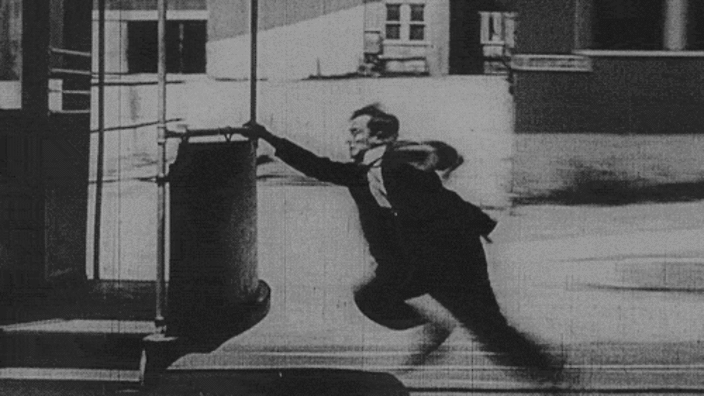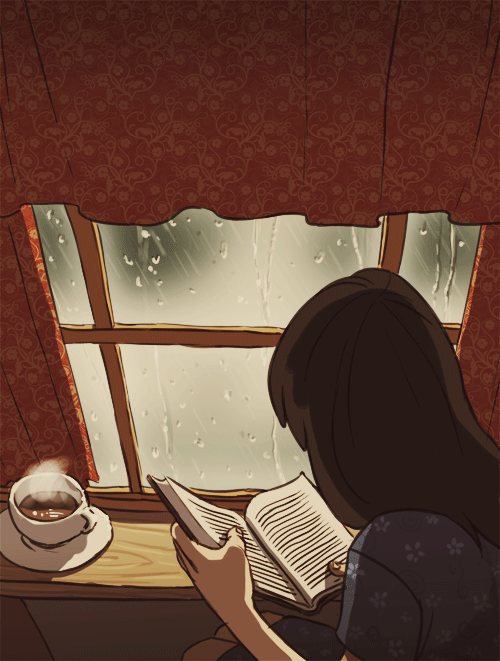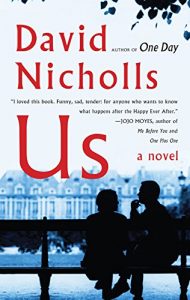How to Stop Time by Matt Haig
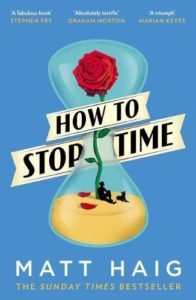 What, you say? Not another time travel novel here at Book Barmy?
What, you say? Not another time travel novel here at Book Barmy?
Maybe or maybe not – stick with me here, this one is different.
In How to Stop Time, Mr. Haig has conjured up a unique spin on the typical time travel novel — namely a tale centered around the ability (or curse) to live a very, very long time.
Tom Hazard, (full name Estienne Thomas Ambroise Christophe Hazard) was born in 1599 and suffers from a rare genetic condition that makes him age very slowly. He has been alive for the last 400 or more years. The book opens with this wonderful first line:
I am old. That is the first thing to tell you. The thing you are least likely to believe.
Over the centuries, Tom has lived many lives and because of his longevity, many of those lives were filled with love, but also heartbreak and loss.
On the positive side Tom got to work at the Globe Theatre with William Shakespeare, rubbed elbows with F. Scott Fitzgerald, and sailed with Captain Cook, all while avoiding anyone who grows suspicious of his glacial aging process.
Tom is recruited into the Albatross Society which pledges to protect people with his disease. The only stipulation is that he has to change lives every eight years and he is given this warning:
“The first rule is that you don’t fall in love,” he said… “There are other rules too, but that is the main one. No falling in love. No staying in love. No daydreaming of love. If you stick to this you will just about be okay”.
In an effort to make up for the no love rule, Tom is reassured:
“You are, of course, allowed to love food and music and champagne and rare sunny afternoons in October. You can love the sight of waterfalls and the smell of old books, but the love of people is off limits.”
But all Tom wants is to live a normal life and find his long lost daughter who also suffers from the same genetic condition. When the book opens, Tom has settled into teaching at a London high school, and of course he chooses to teach history, because:
It [history] isn’t something you need to bring alive, because it already is alive. Everything we say, do and see is only because of what has gone before.
He adopts a dog and finds himself attracted to the French teacher Camille, but he must resist because of the society rules. Soon it is time to take on another persona, and move on to yet another life and another adventure.
That’s all the plot I’ll give away from this engrossing tale.
Mr. Haig transports the reader back and forth in history. But, he doesn’t beautify — instead he unveils the filthy, muddy, smelly reality of earlier times. We see Shakespeare writing his beautiful works against the backdrop of crime, bigotry and disease. Tom plays the lute in the marketplace right beside animal filth. Everyone drinks ale, because the water might kill you.
For me the most interesting part of How to Stop Time, was the irrationality of the human experience. People throughout history have always hurt others, made stupid mistakes, been egocentric, and continue to do so — over and over and over again. And important note, we haven’t become wiser over time:
The lesson is that ignorance and superstition are things that can rise up, inside almost anyone, at any moment. And what starts as a doubt in a mind can swiftly become an act in the world.
Which brings one to ponder long after the last page. How would you live — how would you act — and mostly how would you feel — knowing you could live almost forever?
How to Stop Time is handsomely written and filled with the bittersweet truth of the human experience — our capacity to endure pain, inflict hurt, but also our ability to love beyond any limits, even those of time. All while carelessly bumbling through our ever-so-short lifespans.
A digital review copy was provided by Viking via Net Galley.
Lillian Boxfish Takes a Walk by Kathleen Rooney
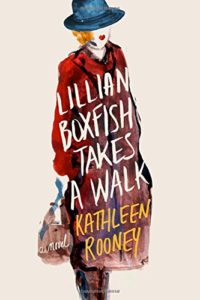 Sometimes a book cries out, nay screams, to be read. Thus was the case with Lillian Boxfish Takes a Walk.
Sometimes a book cries out, nay screams, to be read. Thus was the case with Lillian Boxfish Takes a Walk.
Early in 2017, the publishers sent me a digital advanced reading copy, then one of my Book Barmy followers wrote me urging me to read it, also Powell’s Bookstore named it one of the best books of 2017, and finally — surprise! A brand new hardback copy arrived from my friend Peter as a New Year’s gift. And here dear readers — here is the clincher:
I really do think you’ll enjoy it. It’s beautifully written . . . witty, pithy, upliftingly sad in a weird way. Lillian is someone you want to take to lunch and drink lots of manhattans.
(the note from Peter, my smart, literate friend and Book Barmy follower.)
So I sat myself down, pushed all my other books aside and opened up Lillian Boxfish. And Peter was right, because by page 15, Lillian had become one of my favorite characters… But I’m getting ahead of myself.
Let’s start again shall we?
It’s New Year’s Eve 1984 and 85-year-old Lillian Boxfish is about to take a walk — a long walk. But first, she applies Helena Rubinstein’s Orange Fire lipstick (long ago discontinued-she stocked up), dons her beautiful, forty-year-old fur coat (still a classic) and a pulls on a pair of boots (sensible but stylish). Lillian then takes to the streets of New York, she has planned a long walk, an adventure really, to mark the end of the year — Domenico’s for a do-over on a dinner that ended badly years ago.
She leaves her beloved Murray Hill apartment, where she has lived alone for most of her life,
Alone, but not lonely; in the state of being solitary but not the condition of wishing myself otherwise. Solitude enrobed me like a long, warm coat.
That is the crux of this character-driven novel. Lillian walks (and walks, and walks) through New York City while reflecting on her life. The novel shifts seamlessly between past and present tense unified by Lillian’s witty voice.
Lillian recalls her days as an advertising copywriter and the inner-workings of Macy’s in the 1930’s. Fascinating, as she became one of the highest paid women in advertising. She specialized in humorous jingles and dabbles with poetry on the side. But, she couldn’t avoid the challenges of a career woman in a man’s world.
After falling for and marrying her true love, Max, she becomes pregnant and Macy’s management, like all male-dominated corporations at the time, forces her to quit her career. Lillian does her best to adapt to the stifling role of housewife and mother to their son Johnny, she has some of her poetry published, and does some freelance advertising work — but soon the marriage starts to crumble and so does Lillian.
All these bittersweet reminiscences take place while Lillian continues her walk in late night New York. Her observations of New York City are a tribute to her love for the city throughout her life. There is danger in the air as she walks — this is just after the subway vigilante killings — and everyone she meets is concerned for her safety. But our Lillian cares not. She wants, no needs, to walk. She is strong and fit, still walking miles around the city most days. She especially needs to walk this last night of 1984 ~~she even has a name for it ~~ Solvitur ambulando: It is solved by walking.
As we walk with Lillian we are part of her musings ~~
On the changes in advertising:
Given that the majority of communication to which we are subjected in a day consists of advertising, if nearly all of that advertising insists on regarding us as pampered children, what does that do to us?
And how fame has doomed true character:
People who command respect are never as widely known as people who command attention.
But Lillian is not a grumbler, she has core values worth emulating:
…my true religion is actually civility. Please note that I do not call my faith ‘politeness’. That’s part of it, yes, but I say ‘civility’ because I believe that good manners are essential to the preservation of humanity — one’s own and others’ — but only to the extend that civility is honest and reasonable, not merely the mindless handmaiden of propriety.
The author, Ms. Rooney has given us a great gift with Lillian Boxfish. She has passion for life, despite the cruel blows life dealt her.
The point of living in this world is just to stay interested.
I bet you’re thinking — please, not another grumpy, yet cute, curmudgeon who imparts wisdom and kindness. Trust me, there is nothing cute about Lillian Boxfish. She is a sassy, independent woman who has paid her dues, can often get depressed, but overcomes her life disappointments with classy elegance and a superior wit.
And, like Peter, I would give anything to meet up with Lillian for drinks – preferably at Domenico’s .
Lillian Boxfish Takes a Walk is exquisitely written and the author has a superb vocabulary*. This novel now has a permanent home on my bookshelf. And it should be on yours too.
I plan to re-read it, if only to revel in how wonderful really good writing can be.
+++++++++++++++++++++++++++++++
*Pro-tip: I switched to my Kindle copy just so I could easily look up some unknown vocabulary. But I also referred back to my beautiful hardback edition which includes a map of her walk. Bonus!
Ms. Rooney based Lillian Boxfish on the life of Margaret Fishback, who was the highest paid female advertising copywriter, in the 1930’s. And it turns out all of the jingles quoted in the novel were actual advertising copy written by Ms. Fishback.
A digital review copy was provided by St. Martins Press via Netgalley. (sorry for taking so long to review it.)
Thanks to Peter for the hardback edition.
Peter Mayle 1939-2018
 Sadly, Peter Mayle, best known for A Year in Provence, his 1989 best seller about relocating to Provence, died recently at a hospital near his home there. He was 78.
Sadly, Peter Mayle, best known for A Year in Provence, his 1989 best seller about relocating to Provence, died recently at a hospital near his home there. He was 78.
Mr. Mayle and his wife, Jennie, moved to Provence in 1987, with Mr. Mayle intending to write a novel. But with renovations to the 18th-century stone farmhouse they had bought in full swing, he kept getting distracted. Instead he turned his daily journal of the exploits of the local builders, French lawyers, truffle hunters, local boar hunters and the marvelous food into A Year In Provence. 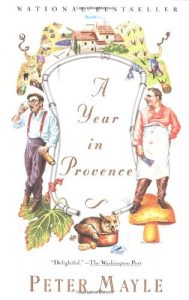 The book became an instant bestseller and was such a phenom, that fans searched out his home.
The book became an instant bestseller and was such a phenom, that fans searched out his home.
There was soon a surge in British folks relocating to villages in France and buying and renovating old French houses.
The Telegraph attributed this to Mr. Mayle:
“[He] somehow tapped deep into a slumbering, latent, hitherto unknown British desire for sunshine and fine wine, for peeling shutters and croissants, for distressed armoires and saucisson and the good life in the French countryside.”
Husband and I did a home exchange with such a British couple. They admitted they had fallen under Mr. Mayle’s spell. Their house was wonderful, but fairly remote, located in French farm country. The couple worked for years on the renovations, learned fluent french, but later sold up and moved to Australia– they’d lived their dream. 
We got to stay in this — their lovely ‘mazet’.
But I digress..
Mr. Mayle went on to write many other books and, while many criticized his writing and his stereotypical casting of French locals, I found many of his books a treat. They reflect his his love of fine food, wine, culture and a little bit (okay a great deal of) of tongue-in-cheek fun with the locals.
My favorites were his later issues, in which his beloved Southern France became the setting for many a crazy caper. Recommended: Hotel Pastis.
Now, for those of you stuck in frigid climes, I suggest you make yourself a nice café au lait and escape to sunny, lavender-filled Provence with Mr. Mayle It’s fairly easy to find his books at the library or a used book store. A list of his publications can be found HERE.
Meanwhile, still shaken from now cancelled Tsunami warnings*, I may grab one of his books and escape myself — I have this one on my shelves, as yet unread… 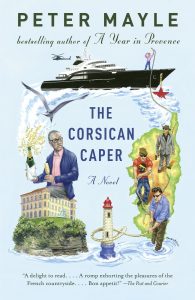
*We live just up the hill from the Pacific Ocean. Warning sirens are installed down on the beach, but they never went off. So actually not as scary as the morning news made it sound.
Catching up to the New Year
Every year I look forward to a quiet week between Christmas and New Years. The holiday feeling is still in the air, the house is cozy and perfect for some major league reading.
Happily, once again, the week was jammed with fun events — entertaining friends, a belated Christmas celebration with others…and even a BBQ with some other friends (sorry to those on the East Coast, but we did eat indoors).
Given all this merriment, I’ve yet to catch up with the New Year and have neglected Book Barmy.
So my New Year starts today. Putting away Christmas things, the last of the treats have been eaten (except for some very yummy peppermint fudge ice cream which only comes out once at year from our favorite ice cream place), and I’m back here to tell you about a book I did get to read last week.
~~~~~~~~~~~~~~~~~~~~~~~~~~~~~~~~~~~~~~
NEW! ~~ Email Notifications
But first a bit of housekeeping: If you did not receive an email notification of today’s post and you wish to do so ~~ just enter your email address below right. You will then receive an email to verify your address and you’re done. It’s a new format so you will have to sign up again. Thanks and Happy New Year to all my loyal subscribers.
~~~~~~~~~~~~~~~~~~~~~~~~~~~~~~~~~~~~~~~~~
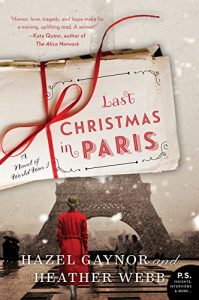
Last Christmas In Paris
by Hazel Gaynor and Heather Webb
In spite of the cheesy cover, this novel grabbed me from the opening pages — and why not? It’s written in my favorite epistolary style, set during WWI, and somewhat about Christmas.
From the blurb:
August 1914. England is at war. As Evie Elliott watches her brother, Will, and his best friend, Thomas Harding, depart for the front, she believes—as everyone does—that it will be over by Christmas, when the trio plan to celebrate the holiday among the romantic cafes of Paris. But as history tells us, it all happened so differently…
Evie, is a British society girl who yearns to do more for the war effort than rolling bandages and knitting socks. Her best friend Alice, her brother, and her brother’s best friend Thomas are all on the front line and having seemingly exciting adventures.
Last Christmas in Paris was co-written by two authors Ms. Gaynor wrote as Evie, and Ms. Webb wrote as Thomas, Evie’s brother’s best friend, a scholar who sees the war as a chance to escape from running the family newspaper. This results in two distinct voices, which through their letters reveal their personalities, hopes, and ultimately their fears during this ‘war to end all wars’.
Initially the letters are full of lighthearted banter as this young group is carried along by the excitement of war, but as the battlefields of France become a nightmare, the letters become start to contain raw emotions, fear and wistfulness for a lost youth.
This is a correspondence of friends evolving- learning war is no great adventure after all, falling in love, and the uncertainly of the future. Ultimately this is a romance, but set against the backdrop of a brutal war. The psychological shell shock that beset many soldiers and how they were treated. The ravages of the Spanish Flu epidemic and the hardships for woman — both involved in the war and at home in Britain.
I devoured Last Christmas in Paris and was drawn in by the fascinating and sometimes haunting letters. There are telegrams interspersed which give the reader the urgency of communicating life-changing words and feelings all during the brutality of war.
There is a timelessness about these letters back and forth — because the expressions of friendship, misgivings, fear, and ultimately, love are indeed timeless. Our mode of communication may have changed in the modern day – but not the heart-felt human emotions.
Because Last Christmas in Paris is not really about Christmas, I recommend this fascinating novel any time of the year.
A digital advanced readers copy was provided by HarperCollins via Edelweiss.
North Wind Manor by T. L. Chasse
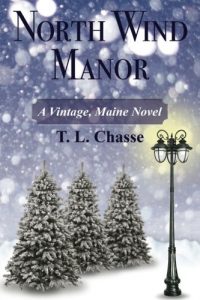 My mother in law hailed from Maine and years ago we read and exchanged a series of books by Elizabeth Ogilive — romantic mysteries set in the small villages and islands of Maine. Ever since then, and because she was one of my favorite people, I have a soft spot towards anything set in Maine.
My mother in law hailed from Maine and years ago we read and exchanged a series of books by Elizabeth Ogilive — romantic mysteries set in the small villages and islands of Maine. Ever since then, and because she was one of my favorite people, I have a soft spot towards anything set in Maine.
So when North Wind Manor came across my radar — just look at that cover — I broke my own rule and asked the author for a copy of this self-published debut to review here on Book Barmy. Happily, Ms. Chasse agreed and I closed the last chapter just the other night with a sigh of contentment.
Turns out this was a lovely first read for my holiday reading season.
Katie escapes her abusive step-father, to live with her long-lost grandparents in New Hampshire. On her way, she gets off the bus at a rest stop and mistakenly gets back on a different bus headed to Maine. Confused, without any belongings, and sick with flu, she arrives in the village of Vintage, Maine and is rescued by Bobby, who himself was rescued by an elderly man named Harry.
Harry has recently died and left his home, North Wind Manor to Bobby who befriended him. Bobby now has a large home and opens up a private room and bath to Katie as she recovers her health.
Bobby and Katie form a sweet friendship and Bobby’s funny and gentle manner slowly wins Katie’s cautious affection. With Katie, we are taken into the comforting arms of small town Vintage, Maine and Bobby’s friends and relatives. Once recovered, Katie finds a job at the local diner where she slowly starts to feel part of the village.
Beneath all this happiness, Katie knows she can’t stay forever, so she contacts her grandparents in New Hampshire. Arrangements are made for her to go and stay with them for a bit. Here the story takes an unexpected turn. I will tell you no more — other than there’s a heroic rescue, interesting characters, and some exiting events.
North Wind Manor is a delightful, non-violent story, populated with real characters. It is a credit to Ms. Chasse’s pacing that I found myself turning the pages, just as with a thriller, to be sure everything turned out alright – and you can trust me, everything does.
Some of my favorite bits were the descriptions of the Maine weather and the lovely coziness of being snowed-in (as if snowed in myself, I cuddled up with a cup of cocoa). I liked the characters and enjoyed their dialogue which is sprinkled with gentle humor and insight. There’s a wonderful homage to Beauty and the Beast when Bobby shows Katie his library. But the best thing about North Wind Manor is the storyline — love found, then lost, the value of friends and community — and finding one’s real family in an unexpected place.
If there are any editors or publishers reading this, you’ll want to keep an eye on Ms. Chasse. While still a bit raw around the edges, she has excellent pacing and is a natural storyteller. In my humble opinion, Ms. Chasse and her Vintage, Maine books have the potential of becoming a best-selling series.
Thank you to the author for providing me with a copy of the book in exchange for an honest and non-compensated review.
Packages are mailed, cards sent, and now I’m able to get to my holiday reading, so stay tuned…
Us by David Nicholls
You can rest assured Book Barmy followers, we’re done with dark thrillers for awhile.
Time for something completely different.
I read another book by Mr. Nicholls (One Day) a long time ago and was not enthralled. I found it one-dimensional and it often trespassed into a sticky-sweet romance.
So, when one of my favorite booktubers, Wilde Reads raved about Us by Mr. Nicholls I was skeptical, but in dire need of a break from dark thrillers – I borrowed it from the library for our recent trip down south.
Douglas and Connie, a British couple have planned a vacation through Europe, but it’s nearly called off when Connie wakes up and says “I think I want to leave you.”
Douglas forges ahead and cajoles his wife to enjoy one last hurrah with their teenage son, who is soon off to college. And thus begins a bittersweet and awkward journey through Europe.
The past and present are told in many short chapters. The family is on a forced march through Europe following Douglas’s precise itinerary, carefully laid out in numerous spread sheets.
Douglas and Connie’s past relationship is slowly revealed — how they met and fell in love, despite being complete opposites. Connie is an uninhibited artist, while Douglas is an introverted biochemist – they marry, inhabit a bohemian London apartment, have a child. We see Douglas struggle with Connie’s artistic and unconventional upbringing of their son, and watch as Connie gives up her art and they move out of London to a larger house with a garden. All seems to be going well – or is it?
These are real people — Douglas, well-meaning but suffering from a lack of spontaneity; Connie, beautiful, charming, and artistic — and their son, Albie, a typical teenager filled with scorn for adult conservatism.
The dynamic between Douglas and Connie is funny and genuinely touching.
’I was looking forward to us growing old together. Me and you, growing old and dying together.’
‘Douglas, who in their right mind would look forward to that?’”
So they’re off to Europe. There are painful scenes when Douglas is trying desperately to ensure everyone is having a good time, but these are contrasted with laugh out loud funny incidents, such as when it turns out Douglas has mistakenly booked the three of them into a questionable hotel in Amsterdam…
“Dad”, asked Albie “have you booked us into a sex hotel?” and they began to laugh. It’s not a sex hotel, it’s boutique, I insisted. “Douglas”, said Connie, “tapping the print of the bound Japanese lady, is that a half hitch or a bowline?” I did not answer, through it was a bowline.
What I most enjoyed about Us was the subtle, bittersweet, and unflinchingly honest writing.
I think our marriage has run its course. I think I want to leave you. It was like trying to go about my business with an axe embedded in my skull.
I could especially relate to this, about Douglas’s ability to appreciate modern art
It’s not about what you liked and didn’t like, Connie would reply, it’s about what it made you feel. More often than not, it made me feel foolish and conventional.
And I had to nod in agreement with this about parties;
Because parties, dinner parties in particular, had always seemed to be a pitiless form of gladiatorial combat, with laurel garlands bestowed to the most witty, successful and attractive, and the corpses of the defeated lying bleeding on the painted floorboards.
This is a cynical, bittersweet, yet loving portrait of a love — of a relationship. A reminder that not every couple can be happy, no matter how much they love each other. These are real and familiar characters; especially the befuddled Douglas, certain he can fix something unfixable if only he applied enough logic, pragmatism, and unfailing optimism.
Mr. Nicholls does not give us a happily ever after ending, no perfect tying up of loose ends. This is a civilized yet loving portrait of the slipping away of a marriage. Like Nora Ephron’s, “Heartburn”, this a funny and touching novel about a situation which, I’m certain, living through would not be at all funny.


